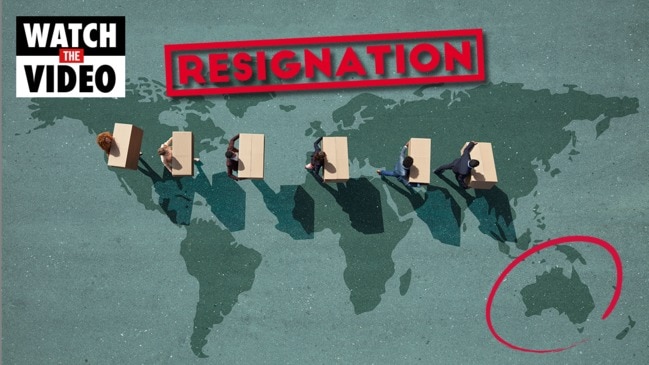Generation Z workers key to easing Australia’s labour crisis
Young Aussies are now the answer to the nation’s “big labour shortage” – if employers will just give them a chance.

Careers
Don't miss out on the headlines from Careers. Followed categories will be added to My News.
Young people could significantly ease Australia’s labour crisis if they were given more opportunities by employers.
Generation Z care less about where they work and more about the number of hours on offer, exclusive findings from digital workplace platform WorkJam reveal.
Nearly one in three young workers are employed for less than 10 hours each week.
But the research – which focuses on frontline workers, like those in retail and hospitality, but has broader applications – finds 60 per cent would consider working from several different locations if it meant access to more shifts.
Nearly half of Gen Z workers, aged 16 to 25 years, would be prepared to travel more than 20km for extra work.
Getting back on track
Gen Z workers from all sectors are under-utilised, according to career coach Leah Lambart, from job site SEEK.
She says many young people finished their qualifications during the pandemic’s freeze on hiring and were forced to take on jobs – and hours – that were far from their ideal.
“But there is a big labour shortage at the moment and this is the opportune time for them to be seeking out work that they really want to do,’’ Lambart says.
“You don’t even have to apply just for advertised jobs – you could go direct to organisations that you really want to work for and ask (for a job opportunity).
“All you need is a very well written cover letter, explaining the reasons why you want to work for that organisation.”

She says microcredentials, which are often free to complete, can boost the skillets and confidence of those who have worked for close to three years in a job not matched to their qualifications or passions.
Those wanting to remain in their current industry but are not getting enough hours should ask their boss for more work or a different role within the business, Lambart says.
Ready to work
Comprising one-fifth of Australia’s population, Gen Z workers should be better utilised to significantly ease talent shortages, WorkJam managing director Andrew Myers says.
“In hospitality, in retail and even in the aged care sector, Gen Zs are definitely looking for more work and … we should be leaning into their skills to fill frontline shifts amid a national labour shortage crisis,” Myers says.
Too often, he says, people are hired to work at a specific store or site within a larger organisation and are unable to view roster availabilities across other company sites, restricting their ability to pick up more hours.
He suggests companies embrace technology that allows workers to be notified of available shifts at all sites, which would benefit both staff and employers.
Maddie blends workload and uni

Working in childcare gives Maddie Henry all the hours she needs to make ends meet.
Henry, 21, started with Milestones Early Learning at Oxley Vale, in NSW, in a casual position while finishing a Certificate III-level early childhood qualification.
Within three months, Henry was offered a part-time permanent position and is now working 37.5 hours a week which she says is the perfect workload, given she is about to start university studies to be an early childhood educator.
“There’s plenty of work (in the childcare sector) and getting those extra hours has really helped to be able to afford stuff,” says Henry.
New research shows many young frontline workers are employed for less than 10 hours a week, despite being willing to take on more hours.
Henry says the childcare sector offers many opportunities but is noticing very few young people enter the profession.
“Most just don’t think about going into childcare,” she says.
“They want to get into really high-paying jobs and things like that but there’s a lot of opportunities (in childcare) and it is a job that is really fulfilling.”
Extreme workforce shortages are crippling childcare centres throughout Australia, with parents being turned away because there is not enough staff.
While Henry says she has been deployed to other Milestones centres to cover staff absences, she prefers to be based at just one site and appreciates having enough rostered hours to avoid working elsewhere.
“It (working from one site) lets you build that relationship with the children so they feel more comfortable around you and they know you’re a familiar face,” she says.
Originally published as Generation Z workers key to easing Australia’s labour crisis


